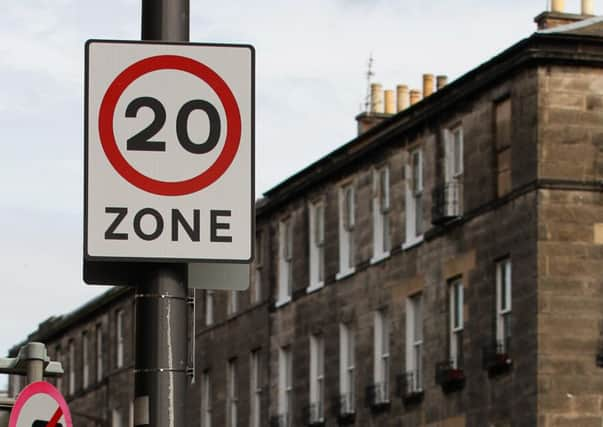Martyn McLaughlin: Scotland could take pride in the 20mph speed limit


How would you react if Scotland became known as the slow man of Europe? The tag represents a novel twist on the albatross which has hung around our neck for decades, yet the notion of a nation plodding meekly on while its neighbours rush by does little to inspire a sense of progress. The presumption that proceeding at an unhurried pace is as good as going backwards has been one of the defining responses to the private member’s bill put forward by Mark Ruskell. The Green MSP is spearheading a change in the law that would bring about a 20mph speed limit on most roads in built-up areas. So far, it has been supported by dozens of MSPs, and Mr Ruskell said he has held positive discussions with Michael Matheson, the transport secretary.
A private dialogue is not the same as a public endorsement, and it would be premature to read Mr Ruskell’s proposal as a done deal, especially given the opprobrium his bill has inspired. The Alliance of British Drivers - owners of the snappy motto, ‘Don’t let them drive you out of your car’ - has declared 20mph areas as a “waste of money, or worse,” while Jamie Greene, the Scottish Conservative transport spokesman, dismissed Mr Ruskell’s idea as “ham-fisted” arguing that the current targeted approach of designated 20mph roads, carried out in consultation with the public, represents the best way forward.
Advertisement
Hide AdAdvertisement
Hide AdSuch arguments against sweeping, mandatory changes to the way we drive may sound familiar to motorists of a certain age. There was a time when the RAC, asked for its views on one of the most significant road traffic policies in generations, railed against the suggestion it should be compulsory.
“The time for consideration for such a drastic measure has not yet been reached,” it implored. “Strict enforcement would have undesirable effects on relations between police and public, many of whom would justifiably resent prosecutions and convictions.”
The issue at play was the introduction of seat belt legislation. The year was 1973. Halcyon days, indeed.
Such a harrowing snapshot from the history books ought to provide encouragement to Mr Ruskell and his supporters.
Their argument is wedded to any number of indisputable facts, the most convincing being a slew of research which shows that reducing the speed limit not only curbs the likelihood of accidents occurring in the first place, but drastically reduces their severity and, with it, the chances of people being killed.
Yet the inability to question such data has not prevented opponents of the bill from seizing upon other data to bolster their cause.
Some have pointed to datasets produced by Transport Scotland as supporting evidence in the hope of having the legislation dismissed as a punitive and disproportionate step. Out of the 7,138 reported road accidents in Scotland, they point out, just 293 involved drivers travelling in excess of the speed limit, resulting in 23 fatalities.
Such numbers, the argument goes, constitutes a small proportion of the number of accidents - and deaths - on Scotland’s roads. Statistically, this is indisputable, but the brevity of the counter argument is even more compelling. It goes something like this; if you think 23 deaths is an acceptable price to pay for drivers travelling too fast, you are an idiot.
Advertisement
Hide AdAdvertisement
Hide AdIn any case, trying to shape policy around road traffic accident statistics is a near impossible pursuit. A rushed, selective reading of Transport Scotland’s bevy of spreadsheets would likely inspire the more excitable of our elected representatives to call for drastic change.
Nearly as many motorcyclists (30) are killed each year as there are pedestrians (31), but is that alone reason for a clampdown on the two-wheeled? Of course not.
Close to 2,000 more male drivers are involved in accidents than women, but should we ban all men from getting behind the wheel? Well, it is tempting, if only for the possibility it may spark the spontaneous combustion of Jeremy Clarkson.
The awkward, cloying reality is there is no one-size fits all policy approach that will address these issues, and that applies to the speed limit question.
A 20mph limit is not suitable for all suburban roads, and it is important to recognise there are sparsely populated roads which serve as crucial arteries. Indeed, Mr Ruskell’s bill recognises this, and would grant local authorities powers to exempt various roads from the 20mph limit.
Scotland has a commendable record in reducing the number of road fatalities and serious accidents. In 2006, there were 293 deaths. That number plummeted to just 175 in 2016, despite the fact the intervening decade saw an increase of around 350,000 licensed vehicles.
But progress cannot invite complacency, not when there are so many other lives that could be saved. The majority of us are drivers, and a similar proportion, I like to think, are reasonable, considerate people. Yet these two welcome facts are not always compatible.
Provided Mr Ruskell can navigate his bill through Holyrood, its success will likely depend on an advertising blitz to raise awareness and bring about attitudinal shifts. It happened in 1967 when the first drink driving limit was introduced, and again in 1983 when front seatbelt wearing regulations became mandatory.
One day, I hope, Scotland will take pride its slow man of Europe, but will it take time and perseverance. Just ask the tortoise.